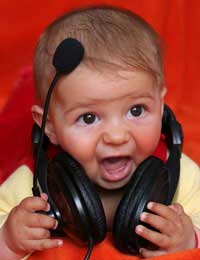What do Babies Hear?

When a baby is born his/her auditory system is the most strongly developed of all the sensory systems. This means that in general babies respond to the world first through their hearing before all of their other senses. Many parents are surprised that hearing is more developed than sight in newborns, but in the first year of life the two sensory systems develop so that toddlers begin to explore their worlds with both of these systems almost fully developed. Some children, however, are born with limited or no hearing, so if parents or caregivers begin to worry about their children’s hearing then they should consult a GP immediately.
Hearing at Birth
Newborn babies can hear almost as well as adults fairly soon after their birth. A few slight impediments may exist, such as that many infants are born with fluid in their middle ear which obscures hearing slightly, and often the other ear “equipment” that is used for hearing is slightly underdeveloped in infants. This, however, is natural and develops as the baby grows. Parents may notice these slight challenges to hearing as infants generally respond more frequently to very high pitched or overly loud sounds, such as exaggerated human voices. Parents may also notice that a baby seems to respond well and distinguish their own voices – particularly the voice of the mother – from others, which many believe is a result of hearing these parental voices while in the womb.Concern about a Child’s Hearing
While there are methods of screening newborns for hearing loss, some babies are still not tested after birth so parents will need to observe their child and contact their GP if they become concerned about their child’s hearing. Infants will generally have a startled reaction to loud sounds and turn towards a voice in the first few weeks and months of life, so these are clues that parents should look out for if they worry about their child’s hearing. A variety of causes may contribute to hearing difficulties in children, so testing, diagnosing and treating these difficulties immediately is in everyone’s best interest.Deafness and Children
Over 800 children are born with significant deafness each year in the UK. If a child does suffer from hearing loss, a GP will best recommend a course of action or put families in touch with hearing specialists. Sometimes deafness and hearing difficulties are treated with hearing aids while in other cases they may be treated with surgery or simply waiting as the child grows. For children with significant hearing loss, learning to lip read and use British Sign Language may be suggested for communication.Unless an infant suffers from hearing difficulties or deafness, (s)he will be born with hearing that rivals an adults’ in just a short while. Not only will infants hear noises and voices, but be able to distinguish pitches and tones as well. Speaking to babies in reassuring tones, playing soothing music and singing gentle songs will all help children develop their hearing and later language skills. If infants do not react to voices or noises, parents should contact their GP to discuss the possibilities of hearing difficulties. Testing for hearing loss is not difficult, and the sooner a baby is diagnosed with hearing loss or deafness the sooner treatment can begin.
- When Should You Worry About Your Child's Development?
- Your Child's First Steps
- Spatial Awareness in Young Children
- Handedness in Children
- Babies Awareness of Colours
- What do Babies See?
- Babies and Crawling
- Encourage Your Child's Physical Development
- Brain Development in Young Children
- Toilet Training and Children


Re: Child Temper Tantrums
I work with 2-3 year olds and I find it useful to validate their feelings. For example, "I know you are very upset right now and you want…
Re: Speech Therapy for Children
Dear Speech Therapy Clinic, I am writing to inquire about speech therapy services for my 3-year-old son. I have noticed that he…
Re: Child Temper Tantrums
I often use my book center for a calm down center. It is not a punishment but a place to take a break and calm down quietly
Re: Mahler's Theory of Development
I'm learning a lot about the end theories .
Re: Child Temper Tantrums
As an assistant director, I get brought kids who the teachers are struggling with to help calm them down. I bring them into my office, we…
Re: Brain Development in Young Children
Hi I have a son. He is 2 and half years old and he is diagnosed with autism. He doesn’t respond to his name and appears…
Re: Child Temper Tantrums
i think once you start to learn the child handling their behavior is easier. it takes time but patience is a virtue!
Re: Erikson's Theory of Psychosocial Development
No, children develop in their own pace for example, a 1-year-old would develop to hold a pencil and another…
Re: Extra Tutoring: How Do I Pay?
i am looking to help out students with private tuition as their parents cant afford it i would like to apply for grants or…
Re: The 'Terrible Twos'
child throws temper tantrum when its cleanup time even when singing the cleanup song, hits my hand and starts pulling the toys back out of the…